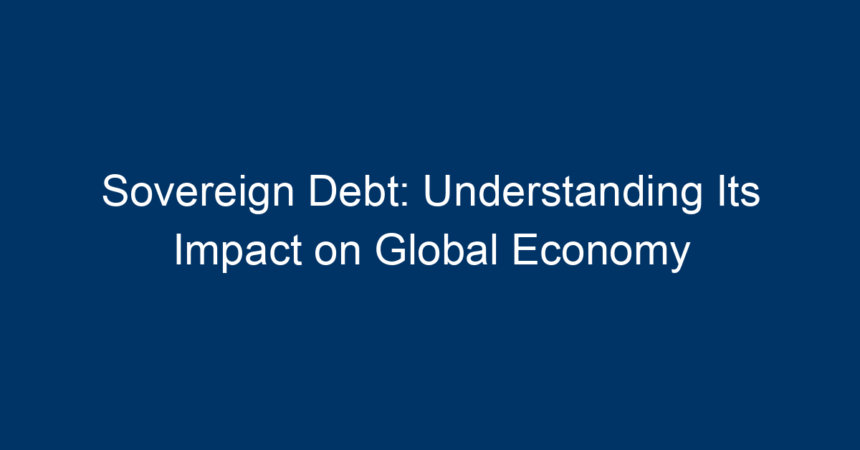The world of finance operates on a fragile balance, with each nation playing a pivotal role in shaping the global economic landscape. One of the most significant yet often misunderstood components of this balance is sovereign debt. As countries borrow to finance public spending, the implications of their borrowing decisions reach far beyond their borders. Understanding sovereign debt is crucial for deciphering today’s economic climate and predicting future trends. Let’s delve into what sovereign debt is, its impact on the global economy, and its potential implications for communities around the world.
What is Sovereign Debt?
Sovereign debt refers to the money that a country’s government borrows to cover expenditures that exceed its revenue. This debt can be issued in the form of government bonds or treasury bills and is typically denominated in the nation’s currency. Borrowing enables governments to fund essential services, infrastructure projects, and social programs, but it can also lead to significant financial challenges.
Types of Sovereign Debt
-
Domestic Debt: This is debt issued in the local currency. It is typically held by local investors. For example, a country like Japan issues bonds in yen, which are primarily purchased by Japanese citizens and institutions.
-
Foreign Debt: When governments borrow in foreign currencies, it introduces additional risk. For instance, if a country issues bonds in U.S. dollars, fluctuations in exchange rates can affect the cost of repayment.
- Multilateral Debt: Governments may also borrow from international financial institutions like the International Monetary Fund (IMF) or World Bank. These loans often come with specific stipulations that the borrowing country must adhere to.
The Role of Sovereign Debt in Economic Policy
Sovereign debt plays a critical role in economic policy. Policymakers use it to finance budget deficits, stimulate economic growth, and invest in public goods. However, managing sovereign debt effectively is challenging. Excessive debt levels can lead to higher interest rates, reduced investment, and ultimately, a stifled economy.
The Impact of Sovereign Debt on the Global Economy
Sovereign debt influences the global economy in myriad ways. Here are some key areas of impact:
1. Interest Rates
Countries with high levels of sovereign debt often face higher interest rates. Creditors see these nations as riskier investments, leading to elevated borrowing costs. Elevated interest rates can dampen economic growth by discouraging private investment. This cycle can lead to a slow economic recovery, making it challenging for nations to manage their debts effectively.
2. Currency Value
Sovereign debt levels can impact the value of a nation’s currency. High debt levels might lead to concerns about a government’s ability to repay, causing depreciation in the currency’s value. A weaker currency can make imports more expensive, fueling inflation and creating a challenging economic environment.
3. Global Financial Stability
A significant sovereign debt crisis in one country can have domino effects, destabilizing economies globally. For example, the European debt crisis highlighted how issues in Greece, Portugal, and Ireland affected the entire Eurozone, leading to global uncertainty. Investors may flee to safer assets, causing volatility in markets worldwide.
4. Trade Relations
High levels of sovereign debt can strain trade relations. Countries may find themselves negotiating harsher trade agreements, absorbing the brunt of economic pressures from creditors. This, in turn, can affect global supply chains and international investments, leading to a less interconnected global economy.
5. Fiscal Policy
Sovereign debt impacts a government’s fiscal policy. High debt levels often lead to austerity measures—cuts in public spending and social services designed to reduce debt. While these measures may stabilize debt levels in the short run, they can lead to long-term implications for economic growth and social stability.
The Dynamics of Sovereign Debt Crises
Sovereign debt does not exist in a vacuum. Crisis situations can arise from multiple factors:
Economic Mismanagement
Poor fiscal policies or mismanagement can lead to unsustainable debt levels. Countries like Zimbabwe have experienced hyperinflation due to excessive money printing aimed at paying off debts, resulting in a devaluation of currency and economic collapse.
External Shocks
Events such as natural disasters, global recessions, pandemics, and geopolitical tensions can impact a country’s ability to meet its debt obligations. The COVID-19 pandemic, for instance, caused significant economic disruptions, leading several nations to struggle with existing sovereign debt.
Dependency on Foreign Investment
Countries heavily reliant on foreign investment and loans may find themselves vulnerable to shifts in investor sentiment. A sudden withdrawal of foreign capital can exacerbate sovereign debt issues, leading to a crisis.
Lessons from Sovereign Debt Crises
1. Diversification of Debt Sources
Countries can manage their risk exposure by diversifying their sources of finance. Accessing both domestic and international markets, along with a mix of currencies, can provide more stability.
2. Sustainable Fiscal Policies
Governments should prioritize sustainable fiscal policies that avoid high levels of debt relative to their GDP. Achieving a balanced budget or a budget surplus can bolster a country’s creditworthiness and economic resilience.
3. Emergency Preparedness
Developing contingency plans to prepare for economic shocks is vital. Establishing stabilization funds and emergency reserves can cushion the impact of sudden financial crises.
4. Strong Regulatory Framework
A robust regulatory framework helps promote transparency and trust in sovereign debt management. International cooperation can also play a crucial role in ensuring that debt remains manageable at the global level.
Conclusion: The Future of Sovereign Debt
As the world continues to navigate complex economic landscapes, the ramifications of sovereign debt will remain a significant focal point. Understanding its implications can empower citizens, governments, and investors to make informed decisions.
Actionable Insights
- Stay Informed: Monitor global debt levels and trends in economic policy.
- Advocate for Sustainable Practices: Support policies fostering fiscal responsibility at both governmental and corporate levels.
- Invest Wisely: Diversification in investment can provide resilience against sovereign debt risks, especially in emerging markets.
By comprehensively understanding sovereign debt, stakeholders can navigate the intricate web of global finance and contribute to a more stable economic future. Whether you’re an investor, policymaker, or simply a concerned citizen, recognizing the role of sovereign debt in the global economy is crucial for informed decision-making and advocacy.




